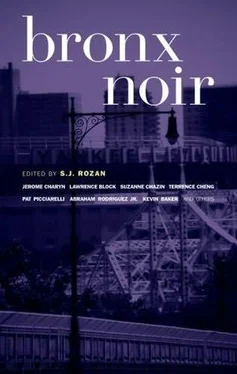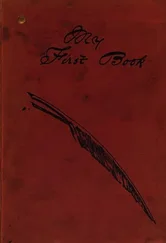Mike continued his walks alone at night. Of course, in Tremont alone was a relative term. Even at 3 a.m., salsa and rap blared from open windows along with the smell of fried porkchops, rice and beans. Beer bottles shattered on concrete. Dirty diapers dropped off the edges of fire escapes. Car alarms whooped. Trains rumbled overhead. Babies wailed. Fights spilled out of doorways like liquid mercury, carried along on whatever current picked them up.
No one bothered Mike. The NYPD jacket and badge probably helped. But he suspected he inhabited the jacket the same way he inhabited his turnout coat. He wasn’t a cop any more than he was a firefighter. Not in his marrow — not like some of the guys. Not like Tig. He knew this when he saw Tig lower himself unflinchingly into a fire-charged room or push forward when his alarm told him he had just minutes of air left in his tank. Never a minute of self-doubt or hesitation. Three fucking years in the FDNY and the guy was more of a firefighter than Mike, with his ten, would ever be. And the goddamn prick slept well too.
Was there a connection here? Mike wondered. Lose the fear of death and you lose the fear of sleep? For what was death, really, but a longer, richer cousin?
He needed a place to test his hypothesis. He didn’t have to look far: Jerome Avenue, a test of nerves if ever there was one. One wide lane of traffic in each direction. Double-parked cars that made pedestrians nearly impossible to notice. Badly timed lights. Third World gypsy cab drivers who thought stopping on red was merely a suggestion. Four people had died in the past six months crossing near his firehouse. The guys had taken to tying Rufus up on nice nights so he wouldn’t decide to follow the rigs and end up as roadkill.
Two nights later, at dusk, when traffic was at its peak, Mike crossed against the light. His heart thumped, his bowels turned to jelly, but it did not help him sleep. The next night he was off, he hopped onto the Jerome Avenue elevated tracks, just to see how long he could stand there before he lost his nerve. Again, his limbs quivered when he heard the approaching train and felt the vibrations along the tracks. Again, he shivered and sweated, felt his bowels go weak and a giddiness overtake him as he scrambled up the filthy concrete wall that separated the tracks from the platform. But sleep did not overtake him. Both the engine and truck went out all night for small fires, false alarms, and medical emergencies. Short of being in a coma, there was no way to sleep through an air horn.
Still, Mike felt convinced there was something to his hypothesis. If only he could find the right test of nerves. The third night he was off, he set a fire in a trash can at the back of a five-story tenement under demolition. The lot was rimmed in razor wire, but a set of bolt cutters, borrowed from the firehouse, cut through the chain-link cleanly.
The tenement, still imposing from the street, was a shell at the back. No windows or doors. Just a warren of crumbling plaster rooms held up, it seemed, by iron scaffolding and plank walkways. A brace on a withering limb.
The plan had been to set the fire, see how long he could take the heat, then extinguish the flames. But it didn’t work out that way. The flames burned hotter and higher than Mike had intended. They latched onto one of the overhead planks on the scaffolding, then curled around it like an old woman’s fingers. Gray-black smoke snuffed out the reflected glow of streetlamps, leaving Mike confused and disoriented as he stumbled backwards over mattress springs and old tires. When he regained his bearings, he became aware of a new light. It was pale and flickering at first, but it was growing inside one of the second-story windows.
He had become so used to the sirens, it took him a full minute to understand that the rigs he was used to seeing from the back were now barreling toward him, lights ricocheting like gunfire off the surrounding low-level buildings. Smoke was churning out of the second-story window now. There was nothing Mike could do but run. He tossed the bolt cutters in some weeds and scrambled over to the hole in the fence. His foot caught the remains of a shopping cart and he stumbled, bruising an elbow and knee in the fall. He didn’t even feel the pain as he climbed through the fence, then ran down a narrow gap between a bodega and a liquor store. He felt certain that at any moment he’d feel the thud of a fist on his back — Chuck’s probably. Somebody from the firehouse had to have seen him. What could he say? What had he done?
It took less than five minutes to reach the firehouse, but it seemed like an eternity. Both rigs were out. A firefighter on housewatch had recorded a 10–75, FDNY code for a working fire. Mike could hear the dispatch reports across the department radio. Box 4311 — he’d remember that number for the rest of his life. It was a second alarm now. Fifteen companies. A hundred and twenty men and a deputy chief to boot. Jeez, he was up to his eyeballs in this one.
He couldn’t just be here waiting when the guys returned. Should he call a lawyer? The union rep? He walked into the locker room and stared into his hands. Did they smell of smoke? He couldn’t be sure given the pervasive odor of mildew and chlorine disinfectant. Were there telltale burns? He looked at himself in the mirror. His eyes were bloodshot. He needed a shave. His left elbow and knee had begun to swell slightly but the discomfort was nothing compared to the dizziness and nausea that had overtaken his body. He stumbled to the bunk room and collapsed on his bunk. No rigs. No firefighters. Even Rufus, for once, stayed away.
It was five hours before he awoke — the longest sleep he’d had since he left Gina. He couldn’t recall where he was. A shaft of morning sunlight shot across the bunk room, illuminating dust motes in the air. Tig was drinking a cup of coffee and checking his work calendar in his locker.
“Hey, Mikey, ten minutes more and I was gonna check you for a pulse. We’re on duty at oh-nine-hundred, you know.”
Mike tried to speak, but his throat felt as scratchy as the city-issued wool blanket across his bed. His elbow and knee were tender to the touch.
“I hear we both missed a good fire last night. At that vacant on Tremont Avenue. It went to three alarms.”
“Shit.” Mike closed his eyes. He’d been hoping he’d dreamed that. “Anyone hurt?”
“I think a couple of the usuals tapped out. Back injuries. But you know a lot of that stuff is bullshit.”
“Ummm.” Mike studied Tig tapping a pencil on his work calendar. Tig wasn’t the subtle type. If he suspected anything, he could never have hidden it this well. Then again, he wasn’t on duty last night. They were both working the exact same schedule.
“Are the fire marshals investigating it?”
“Probably. We just put the suckers out. The rest is somebody else’s problem, right?” Tig frowned at him. Mike’s hands were shaking. “You gotta get out of this firehouse, my friend.”
“I get out.”
“I mean for real. They ever find your car?”
Mike shook his head no.
“I got a friend at the police impound lot. Sometimes stolen cars end up there and it takes awhile before anyone gets around to letting the owner know. I’ll give him a call, see if he can find out anything.”
Downstairs, Mike’s presence was regarded with the usual mix of blank stares and indifference. No fire marshals came to the firehouse. No one asked where Mike had been last night or what he’d been doing. No one seemed to miss the bolt cutters. Only Mike felt strange. Clenched and claustrophobic — like he was breathing through a straw. But as the day wore on, as he went into his next tour and the next night with no sleep, only the dull ache of his elbow and knee for company, he began to look back longingly on those few hours when he made the trucks and firefighters and noise go away. He — Mike Boyle, a ghost in his own firehouse — he controlled the shots. Not Tig or Chuck or Captain Russo or some staff chief downtown. They only reacted.
Читать дальше












